|
I've been encountering more and more parents lately who are leaving their children with a caregiver to go back to work. It's become a necessary part of our lives in these modern times, but it doesn't make it any easier to do. I always try to remind those parents that it is probably harder on them than it is on their children. Kids love to be social. Babies who live in isolation often become socially awkward. They haven't learned how to interact with people other than their immediate family. None of us are born shy. We are born seeking the attention and approval of those around us. You can see that when you observe newborns. They are constantly seeking eye contact, reaching out to us with their eyes.
Even the most well-meaning parents can create shy children by keeping them away from others. Of course, we want to protect our children, but it's important not to overprotect them. Eventually, every child has to go out into the world, whether it's going to school, on a playdate or other activities without parental protection. It's a very good thing for children to have activities they do alone. That's what teaches them to navigate this wide world. Unfortunately for me, I didn't learn this until I was an adult and, as a result, made some very bad and dangerous choices. Luckily, I survived the consequences of my well-meaning parents' mistake, but many don't. So ... what does this have to do with parents going back to work? Everything! It takes a village to raise a child. Humans have known this for thousands of years. Relief for the parents is not the only reason for this. It is also for the well-being of the child. We are all very different. We have different styles of living and relating to each other. And, we encounter those varieties of styles in our lives. Don't we want our children to be prepared for that, as well? When a parent is forced to go back to work, they are forced to use the "village." It's a good thing. But, with the age of the nuclear family, we've forgotten how important it is to leave our children with friends, neighbors and relatives, and with elders who will impart their wisdom. If we only expose our kids to these rich resources when we are present, they will not get the same benefit. They will only get what we feel comfortable with, or what transpires from the relationship between the adults. I hear many tales from children about the wonderful times they have with their grandparents. As a grandparent myself, I know that I am very different with my grandchildren than their parents are. I have different rules. I eat different foods. I do different activities with them, and I teach them different things. It's not harmfull to them, it's helpful. It's the same thing when they go to daycare, whether it's a home daycare or an institutionalized daycare setting. They learn to navigate new situations. Now, the big question is, how do parents survive leaving their young children? Talk to other working parents. Don't be afraid to let your friends and family know where you're struggling. And, yes. Cry when you need to. Set your priorities so that spending time with your children is on the top of the list. Try not to focus so much on catching up with chores that you neglect yourself or your children. Try to include them in some of the chores, if they're old enough. A very young child can sort socks out of the clean laundry, or pull out towels to be folded. In that way, you are teaching them life skills and having fun together at the same time. And, don't keep them so busy with extra activities that they forget how to entertain themselves or don't have down time for using their imaginations. It's easy to feel guilty for not having what you think is enough time with them. Children are incredibly resilient and will make the most of what they have. Maybe we can learn from them.
0 Comments
How many of us feel totally comfortable having conversations with infants? I imagine not everyone is raising their hand. When we talk to infants, we feel as though we are having a one-way conversation. It feels like we're talking to ourselves. In reality, we are talking to a sentient being who understands much more than we realize. Often they coo, or "talk" back to us. It can be frustrating not being able to understand what it is that they're saying, but they are definitely saying something.
I've been hanging out with infants more than usual lately and am struck by how intent they are when vocalizing. When we respond they listen just as intently. So, what should we be saying to them? Whatever we want to say. We can certainly tell them how wonderful they are, strong, capable and smart. But, we can also tell them about our day or narrate our activities as we go through our day with them. Babies learn to talk by listening to others. They learn the art of conversation from listening to conversations. When I talk to babies who don't yet have words that I understand, I often reply, after they've "said" something to me, "Wow, that's so cool." Or, "I didn't know that." In that way I am modeling a response which is an important part of conversation. Conversation is listening and replying with an appropriate response. Conversing with babies also signals their importance. We want them to know that we value them, so we pay rapt attention to them. They seek eye contact regularly. That eye contact helps keep them grounded. Conversation also help expand their vocabulary and often encourages them to speak early. That's why it's important not to do "baby-talk" with them. Talk to your baby as though (s)he understands every word. Don't simplify your vocabulary, rather expect them to learn it. People used to remark on what amazing vocabularies my children and grandchildren had at a very young age. That's because I spoke to them as I would an adult. That doesn't mean that I talked about complex ideas, but it means that I didn't dumb down the words I used. Babies start learning from the moment they are born. They are like little sponges, soaking up everything they see and hear. For that reason, please set aside your discomfort and talk to your baby as much as you can. They will thank you for it, maybe earlier than you expect. Remember that they are real humans inside these tiny bodies, trying to figure out how to communicate effectively. They work very hard at it, too. I think we should match their enthusiasm. We all want our children to be self-confident, but there is a fine line between self confidence and arrogance. Certainly, praising our children is the best way to instill self-confidence, as I have always done, telling them that they were capable of anything, if they worked at it. However, I also pointed out their challenges. When one of my sons behaved like a bully, I was right on top of it. When another son was allowing himself to be bullied, I dealt with that, too, not by stopping the bullies, but by helping him find his strength to stand up for himself. In that way, a child feels their self-worth and gains more confidence. My own mother always tried to fix everything which made me feel weak and incapable of taking care of myself. When I became an adult, I struggled to find my inner strength that would protect me from attacks. As a result, I went overboard with my daughter and eldest. I urged her to speak up for herself and ask for what she wanted at a very young age. Maybe she was a little too young when, at age three when we were at a fast food restaurant, I insisted she go up to the counter and ask for the extra ketchup she wanted herself. She did it though, and is now one of the strongest women I know.
In addition to the encouragement, we need to acknowledge that everyone has weaknesses, including our children. We don't do them any favors by ignoring those flaws. The more they can acknowledge where they struggle, the more their confidence will build and grow. One of my grandchildren is quite arrogant, believing they can do nothing wrong and have nothing to learn. I can see how that will hold them back in life. We grow through learning and are constantly learning new things, no matter how old we are. We do ourselves a terrible disservice in not recognizing that. As a grandparent, I can try to point things out, but in some cases the damage has already been done, and they will have to learn the hard way. Often I hear parents praise every little thing that their children do, no matter how minor. That's great, but it also instills an expectation of being praised. Of course, it's important to celebrate milestones like rolling over, first steps and the like. We are thrilled, and so are they. We want to clap for their achievements, and we should. But once those milestones have passed, those things should be normalized. Children should learn to progress because it is joyful to them, not to please us. They should be learning to love learning because it makes them grow and feel good, not because they want to please us. When we are trying to please others, we forget about ourselves, and it actually undermines our self-worth. We can be encouraging without being doting. With my dad, I felt as though nothing I did was ever good enough. It wasn't until after he died that I learned how proud he was of me and my accomplishments. I definitely could have used more praise from him. My mother, on the other hand, smothered me, never allowing me to live my own life and make my own mistakes. My life was made very difficult in trying to navigate these contradictions. Now, I make plenty of mistakes, but they are mine to make, and I learn from every one. I hope you will let your children do the same while you stand by supporting them, picking them up and dusting them off when they fall and always loving them throughout. I have parented with a partner and without. They both have their advantages and disadvantages. As a single parent, you make all the decisions and don't have to negotiate with someone else when you disagree on techniques. However, it is very difficult to raise a child on your own. It really does take a village to raise a child. One of the big advantages to my single parenting is that, having already raised two children with a partner, I understood the need for support. I quickly found a community and enlisted the help of those community members through trades for babysitting, shared dinners and more. I was always happy to have another child around for mine to play with. It made my life easier and made him happier. When I was 50, I was already raising a teenager and then started raising my granddaughter. I realized that I needed younger people with more energy to take her sometimes, and they did. She was so much of a community child, when I had to go to Europe for work, she happily went from family to family for the 2-weeks I was away. She was 5 and missed me, but these people were part of her extended family, and she felt safe and secure with them.
One of the hardest things about single parenting is the lack of time away from your child. When you have a partner, you can leave them with the other parent. When there is not another parent available, you may feel guilty about abandoning them or guilty about overburdening another family. I had to get over that and remind myself that I loved having other children around, so why wouldn't someone else feel the same? And, I always reciprocated. It isn't only single parents who don't go out enough, couples often don't have enough time together away from their children. Trading babysitting is a wonderful thing for everyone. It's good for our children to experience other routines. It promotes diversity and encourages flexibility. Another struggle for me was feeling overburdened by work and household duties. I wondered if my child was suffering from not having enough of my attention. I had to make the difficult decision to not worry as much about the condition of my house. Maybe the floor didn't get cleaned often enough or dishes always done on time, but it was worth it to have the time to play with my child. They are only young for a short time, and eventually, they start seeking out other people for stimulation. It's important to take time with them while they are interested. I didn't want to have regrets later on, so my chores had to wait. However, it was equally important for me to make sure that my child knew when I needed alone time. As single parents, we should be modeling self-respect and self-care. I didn't want my children to sacrifice themselves as adults because that's what I taught them. Children need to see us having fun and living a full life without the burden of guilt. They want us to be happy. One potential issue that goes along with being a single parent is the issue of dating. That one is tricky and needs its own post. Meanwhile, I can say that it's part of caring for ourselves, and we do want to model good adult relationships, too. Our children learn to love and be partners by watching us. Adding another person into the mix is definitely possible and is a process. I will write more on that next week. I often write about the importance of bringing your children to hear live music. It often stimulates a desire in them to play an instrument or perform in some way. It also offers the opportunity for them to see what the instruments that they've been listening to look like and how the musicians work together to make a complete sound. Children are never too young to go to concerts, though you may have to pick things that are appropriate. By that I don't necessarily mean what music is appropriate but rather what the crowd will be like. Are they rapt listeners? Then, you will want to wait until your child can sit quietly through a show. Is it a rowdy crowd? Then, maybe you don't want a small child in that environment.
My own children went to Grateful Dead concerts at a young age, back when a lot of kids accompanied their parents, and the crowds were more family-friendly. We stayed in the back of indoor venues, so the volume didn’t hurt their ears. Outdoor venues were no problem. We went to many outdoor concerts in various parks on the East and West Coasts. I was always aware of our surroundings and made sure they felt comfortable. Once, I took my youngest to an Alive at Five concert in Albany, NY where there was a lot of drinking. We both felt uncomfortable in a crowd that was inconsiderate and boisterous and left after just a couple of songs. Other times, the same venue was fine. It often depends on the band that’s playing and who they attract. I always checked in with them and left if they’d had enough. We also went to classical concerts geared for youth, pop concerts and even an operetta. My favorite music events to bring my family to were music festivals, some large and some small. Our favorite kid-friendly festivals were the GottaGetGone Festival in Ballston Spa, NY, Old Songs Festival in Altamont, NY, Falcon Ridge Folk Festival in Hillsdale, NY and Champlain Valley Festival in Burlington, VT. My kids and grandkids ran around with a pack of other kids, some of whom they would see only once a year. We would camp for a weekend or extended weekend, sharing food, companionship and music. The kids would make new friends, mingle with the performers, make arts and crafts and often make their own music. The music communities at these festivals became family that we would see every year, widening our children’s horizons and enriching all our lives. I couldn’t possibly list all the benefits that children get from these experiences. They often grow up and then bring their own children. They remember the richness of those times forever. Even my adult children who have moved away and my adult grandson who can’t get away, still share fond memories of the festivals they attended and long to go back. You can purchase day tickets to try it out rather than deciding to camp. Or, if it’s a local festival, you can buy a full-festival ticket and commute. Every festival has volunteer opportunities, too. Some of the crews fill up fast such as my Activities 4 Kids crew at Falcon Ridge Folk Festival. Others always seem to have a few spots available. At Falcon Ridge, you pay a nominal fee to volunteer and receive free admission and camping plus two meals a day, breakfast and dinner, with snacks and drinks provided throughout. That’s the best way to get to know people and join a wonderful community. Kids always get in free, and I’ve never met a kid yet who didn’t want to return year after year. I encourage you to try it, if you’re not already hooked. I'll be at Falcon Ridge this weekend, rain or shine, running the Activities 4 Kids tent. Maybe I'll see you there. |
Archives
April 2019
Categories |

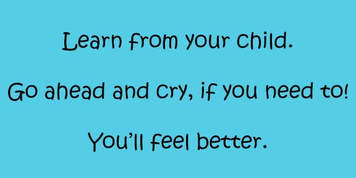
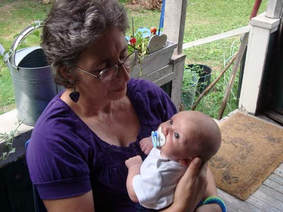
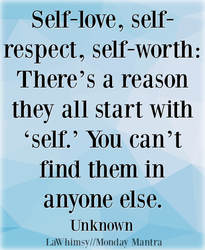
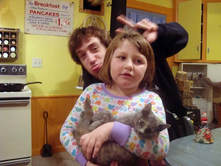
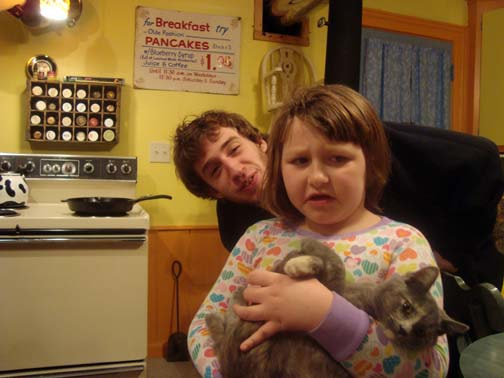
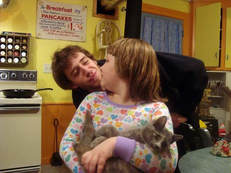
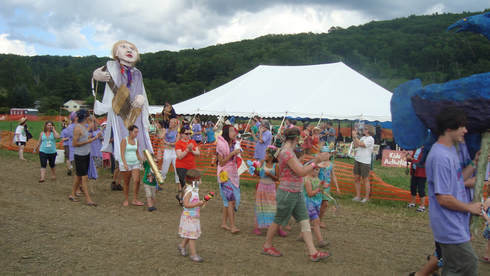
 RSS Feed
RSS Feed